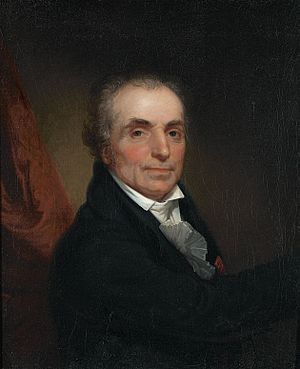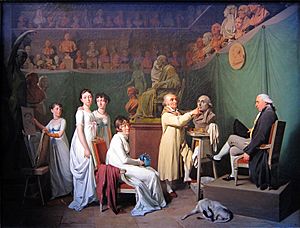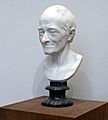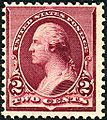Jean-Antoine Houdon facts for kids
Quick facts for kids
Jean-Antoine Houdon
|
|
|---|---|

1808 portrait by Rembrandt Peale
|
|
| Born | 20 March 1741 Versailles, France
|
| Died | 15 July 1828 (aged 87) Paris, France
|
| Nationality | French |
| Education | Académie royale de peinture et de sculpture |
| Known for | Portrait sculpture |
| Spouse(s) | Marie-Ange-Cecile Langlois |
| Awards | Prix de Rome |
Jean-Antoine Houdon (born March 20, 1741 – died July 15, 1828) was a famous French sculptor. He is known for his realistic statues and busts (head and shoulder sculptures).
Houdon was especially good at making statues and busts of important people. He sculpted famous thinkers, inventors, and leaders from a time called the Enlightenment. Some of his well-known subjects include Benjamin Franklin, Voltaire, George Washington, and Napoléon Bonaparte.
Contents
The Life of Jean-Antoine Houdon
Jean-Antoine Houdon was born in Versailles, France, on March 20, 1741. When he was 11 years old, he joined the Académie royale de peinture et de sculpture. This was a special art school where he learned from famous sculptors like Jean-Baptiste Lemoyne.
From 1761 to 1764, he studied at another important school called the École royale des élèves protégés.
Early Career and Awards
In 1761, Houdon won the Prix de Rome. This was a big award that allowed him to study art in Rome, Italy. While in Rome, he created two important works. One was a detailed anatomical model called an écorché. This model showed the muscles of the human body and helped many artists learn about anatomy. He also sculpted a statue of Saint Bruno for a church in Rome.
After four years in Italy, Houdon went back to Paris. He started to focus on making portrait busts, which are sculptures of a person's head and shoulders.
Becoming a Professor
Houdon became a member of the Académie de peinture et de sculpture in 1771. By 1778, he became a professor there. In the same year, he sculpted Voltaire, a very famous French writer and philosopher. He made several versions of Voltaire's bust, including one for the Comédie-Française theater and another for Catherine the Great, the Empress of Russia.
In 1778, Houdon also joined a special group called Les Neuf Sœurs. Here, he met important figures like Benjamin Franklin, who was an American diplomat.
Sculpting George Washington
One of Houdon's most famous works is his portrait sculpture of George Washington. In 1785, Benjamin Franklin invited Houdon to travel to America. Houdon visited Washington at his home, Mount Vernon.
Washington posed for Houdon, who made models from wet clay and a plaster mask of Washington's face. These models were then used to create many sculptures of Washington. The most famous one is a full-size standing statue commissioned by the Virginia General Assembly. This statue is now in the Virginia State Capitol in Richmond.
Houdon also made many different busts of Washington. Some showed him as a general in uniform, while others showed him in a classical Roman style.
Later Life and Recognition
During the French Revolution, Houdon faced some difficulties because of his connections to the royal family. However, he managed to avoid serious trouble.
He later regained favor and was recognized for his artistic talent. In 1804, he was made a Chevalier de la Légion d'honneur. This is one of France's highest awards.
Houdon died in Paris on July 15, 1828. He was buried in the Montparnasse Cemetery.
Family Life
On July 1, 1786, Jean-Antoine Houdon married Marie-Ange-Cecile Langlois. They had three daughters named Sabine, Anne-Ange, and Claudine.
Legacy and Influence
Houdon's sculptures have had a lasting impact. For example, his sculptures of George Washington were used as models for pictures on many U.S. postage stamps in the late 1800s and early 1900s. This shows how important and recognized his work was.
Gallery
-
Bust of Armand Thomas Hue de Miromesnil, 1775, Victoria and Albert Museum
-
Bust of Washington based on a life mask cast in 1786, National Portrait Gallery
-
Bust of Voltaire, 1778, Musée des Beaux-Arts d'Angers
-
Voltaire, 1778, National Gallery of Art
-
Bust of Madame Récamier after Joseph Chinard
-
George Washington, Virginia State Capitol complex
-
Bust of Anne-Marie-Louise Thomas de Domangeville de Sérilly, Comtesse de Pange (1780), Art Institute of Chicago
-
Madame Houdon, Louvre
Images for kids
See also
 In Spanish: Jean-Antoine Houdon para niños
In Spanish: Jean-Antoine Houdon para niños
- Neoclassicism in France
- Washington-Franklin Issues
 | Mary Eliza Mahoney |
 | Susie King Taylor |
 | Ida Gray |
 | Eliza Ann Grier |













